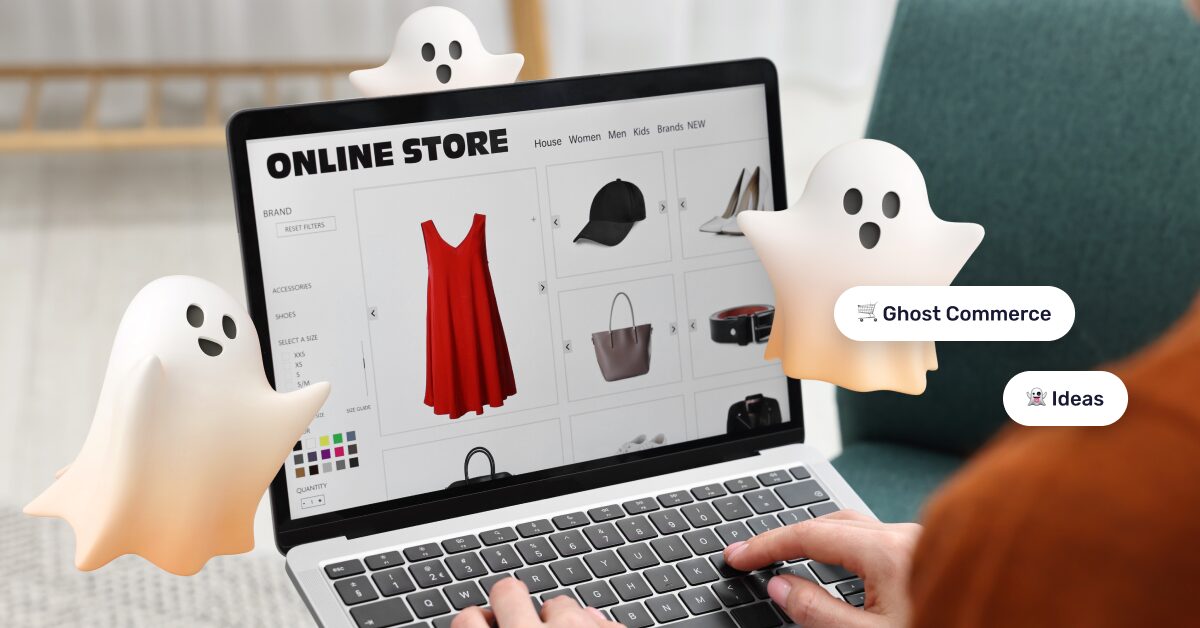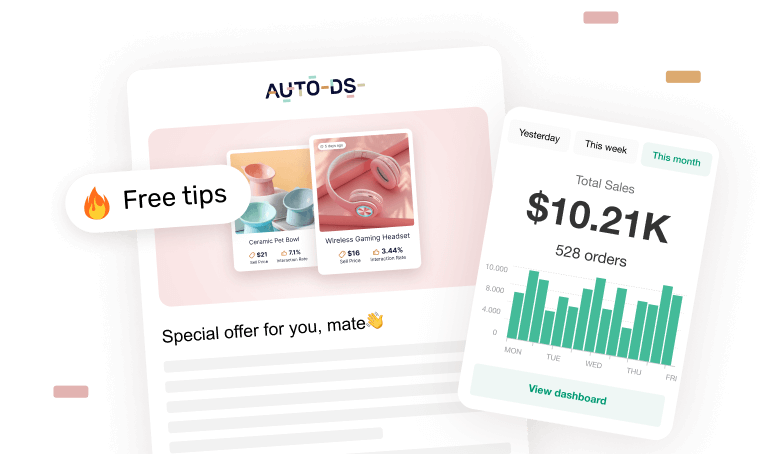Looking for new ways to make money online? Ghost commerce might be just what you’re looking for. In short, it is a low-profile, high-potential business model that lets you sell products online without ever showing your face.
In this guide, we’ll break down exactly how ghost commerce works, how it compares to other e-commerce business models, the pros and cons, and how you can get started. Plus, we’ll show you tools and platforms you can use for smoother operations. For example, AutoDS automates the entire ghost commerce process, from product sourcing to order fulfillment.
Ghost commerce is a low-risk commerce model that lets you sell online anonymously without holding inventory or making upfront investments.
In 2025, it’s easier than ever to start and scale a ghost commerce business, thanks to the rise of social commerce, faceless content, and automation tools.
AutoDS simplifies ghost commerce by automating product imports, pricing, order fulfillment, and more, so you can focus on the strategy.
What Is Ghost Commerce?
Ghost commerce is like running an online store with a cloak of invisibility (any Harry Potter fan out there?). You’re selling trending products, making money in your sleep, and no one even knows it’s you. No face on camera, no personal brand, no customer service phone calls at midnight. Just smart moves behind the scenes.
This low-key business model has exploded thanks to platforms like TikTok and Instagram, as well as influencer culture. But here’s the twist: you don’t need to be the influencer. Instead, you can use viral content, automate processes, and let the products (and the strategy) do the talking.
So, how is this different from traditional models? For starters, it’s definitely not your typical e-commerce. You’re not building a big-name brand or managing inventory like a traditional store, that’s for sure.
And what about dropshipping? They overlap a bit, but dropshipping is just one of the many ways you can do ghost commerce.
How Ghost Commerce Works
Ghost commerce is all about selling products you don’t physically own. This means you only pay for products after making a sale. No inventory to manage, no crazy high risk.
There are different monetization methods to do this, all with different dynamics. The most popular one is dropshipping, but there are also other ways to do it, like affiliate marketing, print-on-demand, or digital products.
Plus, a ghost commerce strategy also relies on high-converting niches, valuable content, and constant promotion to keep the momentum going and turn clicks into consistent sales.
Let’s zoom in.
1. Pick a Niche With A Viral Potential
Ghost commerce relies on picking a niche that’s trending, shareable, and full of buying intent. These highly specific shopping themes attract buyers based on their passions and interests. Think fitness hacks, beauty stuff, tech gadgets, clever kitchen tools, or pet products. The more targeted your audience, the easier it is to create content that sells.
🆕Beginner’s Tip: Pick a niche that is both in high demand and appealing to you. The more you know about it, the more likely you are to know what items to source and how to market them.
2. Choose a Monetization Method
With ghost commerce, you can make money using different methods. These are the most common ones:
- Dropshipping: This is when you sell physical products, and a supplier ships them to your customers for you. Then, you keep the profit margin. Choose this option if you want to create your own niche, targeted store, and have full control over the products you sell.
- Affiliate marketing: This involves promoting someone else’s product at the same price and earning a commission for each sale. Choose this if you’re not really into the whole store creation and sourcing product processes, but you feel like you would smash it at promoting other people’s catalogs.
- Info products: In this case, you anonymously sell digital goods like eBooks or online courses, typically made by others. Choose this if you want to avoid the logistics of physical products altogether.
- Print-on-demand: This is about selling custom products like t-shirts, mugs, or phone cases without holding inventory. You design it, but the items are printed and shipped through a third-party supplier after the order is placed. This is perfect for ghost sellers who want to offer unique items without actually producing them themselves.
3. Create Content (Faceless-Style)
You don’t need to be an influencer to sell online. You just need the influence. How? Creating engaging content—without ever showing your face (yes, it is possible). Here are some ideas:
- Create AI-generated product demos or memes. Let technology do its magic. Just make sure they stand out in people’s feeds.
- Post product photos and videos without showing your face. You can use a voice over, cool music, and your hands to show the product itself.
- Build theme-based Instagram pages or Pinterest boards with curated content from other users (as long as you do it ethically). You can also repurpose viral posts going around social media feeds.
4. Promote and Scale
Once the engine is running, ghost commerce relies on constant promotion to reach new audiences. Again, you don’t need to show your face. Here are some ideas to do this anonymously:
- Organic content on social media is the foundation of your distribution strategy. It’s supposed to build trust, provide value, showcase your products, and engage with your audience. Videos are gold for organic and viral content, but if you don’t feel comfortable, photos and carousels work too.
- Paid ads (especially on TikTok, Meta, and YouTube). When you have a product (or a post) that’s converting, paid ads can scale it fast, reaching new audiences. These are crucial to acquire new shoppers, so it’s good to always have some ads running. Just make sure to start with a small budget, test, and then see what works.
- Influencer collabs. Don’t want to show your face? Let the extroverts do the promotion for you! Influencers tend to have reach, highly engaged audiences, and creative content ideas. Send them your product, negotiate a shoutout, and let them do the selling.
- Email or SMS marketing. There’s more to the digital world than just social media. Email and SMS let you follow up with discounts, product drops, bundles, exclusive promotions, and helpful content. It’s a powerful way to boost repeat purchases and returning customers.
- SEO strategies. Optimizing your product pages for search engines can bring steady, long-term organic traffic. Include keywords in your titles and descriptions, add alt text in your images, write helpful content, and make sure your online store is mobile-ready (especially when using Shopify, Wix, or WooCommerce).
📢 Marketing Tip: Track your metrics on social media, Google Analytics, and AutoDS to see what works. Then, continuously optimize your strategy. Double down on what performs well, and forget about what doesn’t.
Ghost Commerce vs. Traditional e-Commerce
Ghost commerce makes it easy to start selling online. No big budget, no warehouse, no staff. You really skip the heavy lifting. With traditional e-commerce, you manage inventory, shipping, and everything in between. Plus, you’re even building a brand and managing the entire supply chain.
With ghost commerce, your supplier handles all that while you focus on finding products and marketing them. It’s faster, cheaper, and lower risk. That said, profit margins might be a bit lower, but if you play it creatively and smartly, you can get around that.
Here’s how the two really stack up:
1. Budget
The amount of money we have or are willing to invest in our business is the first factor determining the type of store we’ll pursue. You might consider traditional eCommerce if you have the capital to build infrastructure, hire employees, and maintain a larger structure. However, if you’re just starting and your capital is limited, ghost commerce requires a very low initial investment, making it a much more accessible option.
2. Experience
A traditional eCommerce business requires more experience managing similar businesses to operate effectively. On the other hand, ghost commerce allows you to start even if you’re taking your first steps into the business world. When you add the benefits of automation, starting with little experience becomes easier.
3. Niche
Our target audience is a key focus. What we will sell and to whom are some of the first questions we must ask ourselves as merchants. In this regard, traditional eCommerce might be more suitable if we focus on a niche requiring strict quality control or expertise in specific fields. However, ghost commerce could be our best option if we’re looking to sell customizable products. Also it allows us to explore different opportunities across various sectors.
4. Objective
Clarify your business goals and long-term vision. Are you aiming to build a scalable brand with complete control over product quality and customer experience? Or is your focus more on generating quick revenue with minimal overhead? E-commerce is well-suited for businesses that want to develop a strong brand identity and cultivate customer loyalty. On the other hand, ghost commerce may be the better option for those looking for a low-risk market entry with the potential for rapid scalability.
Pros and Cons of Ghost Commerce
Like any business model, ghost commerce has its ups and downs. The key is knowing what you’re getting into before you dive in. In general, these are pretty much the same as dropshipping. Let’s break it down.
Pros of Ghost Commerce
- Low startup costs. You don’t need to buy inventory, rent storage, or hire a team. All you really need is a laptop, internet, and a selling channel to get started.
- Low-risk business. Because you only pay for products after you’ve made a sale, there’s very little financial risk. In other words? No unsold stock sitting in your garage.
- No need to show your face. Hate being on camera or center stage? No problem. You can stay completely anonymous and still run a profitable business behind the scenes.
- Work from anywhere. Want to work from your couch, in a café, or halfway across the world? Go for it. You can manage your store from anywhere, as long as you have access to your platform or selling channel.
- Easy to scale. With ghost commerce, it’s not hard to go from zero to success. The secret? Automation. This makes it easy to populate your catalog with hundreds of winning items, fulfill dozens of orders in seconds, and keep everything on track without manual input.
Cons of Ghost Commerce
- Lower profit margins. Because you’re not buying in bulk or managing fulfillment yourself, your profit per item might be smaller than with traditional commerce.
- You rely on suppliers. If your supplier decides to disappear, you’re the one taking the blame for it. From late shipping to low quality or out of stock, whatever your supplier falls short on reflects on your store, not theirs.
- Less control over branding. Since you’re not handling the products directly, customizing packaging or creating a premium branded experience can be tricky (but no worries, it is possible)
- It can be competitive. Because it’s so easy to start, more and more people are doing it. The solution? Stand out. Be creative with your marketing and product sourcing.
Is Ghost Commerce Legit and Profitable in 2025?
I know what you’re thinking: this all sounds cool, but does it actually work? Absolutely. And is it legal? Absolutely x2. Let’s zoom in.
First things first. Ghost commerce is totally legitimate. As long as you follow each platform and selling channel’s guidelines, you’re good to go. For example, Facebook Shops restricts some product categories, Etsy only allows handmade items, and Amazon has certain packaging and invoice branding requirements. Just make sure to read and follow their rules.
And second, ghost commerce can be highly profitable in 2025. Think about it: you can launch fast, with minimal investment, and tap into viral trends across multiple platforms. Let’s see what makes it so successful:
- Social commerce is booming. TikTok Shop has turned social media into a major sales channel. In 2024, an estimated 43.8% of US-based TikTok users had bought something on TikTok Shop, according to Statista, more than 37% did so on Facebook, and more than 36% on Instagram, according to eMarketer. The scenario is clear: social commerce is no longer the future but the present of e-commerce.
- Faceless automation and AI tools are more accessible than ever. Ghost commerce thrives when you can automate the entire process, from AI-generated listings to hands-off order fulfillment. The wide access to these tools makes it easier for solo entrepreneurs to launch and scale on their own.
- Passive income is the new gold rush. Everyone wants to earn while they sleep with minimal effort, and ghost commerce checks all the boxes to fit in this category. That said, even with automation tools, it still requires some work upfront, like product research, marketing, testing, and optimization.
How to Get Started with Ghost Commerce
Starting a ghost commerce business might sound mysterious, but the setup is actually pretty straightforward. No magic trick or spooky stuff, just smart moves and the right tools. Let’s take it step by step:
Step 1: Choose Your Selling Channel
Before you start selling, you need a place to sell. This is your storefront, where customers will discover and interact with your products (without actually seeing you).
You can build a full online store on platforms like Shopify, WooCommerce, or Wix, or keep things casual by selling through TikTok Shop, Etsy, Amazon, or eBay. Pick what fits your style and audience.
🆕Beginner’s Tip: Want to start in just a few minutes? Try AutoDS’s AI-built Shopify store and tadah! Your ghost commerce is ready to start making sales.
Step 2: Conduct Product Research
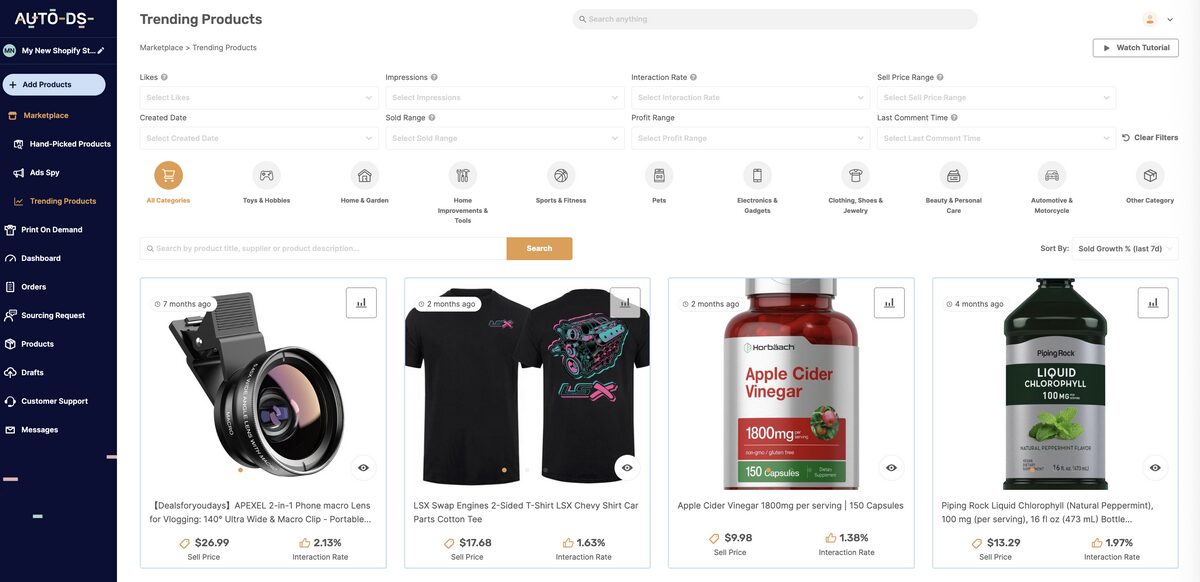
Now, it’s time to choose what to sell, because it’s not just about selling anything. Ghost commerce thrives on hot, in-demand products that people want right now. Your job is to spot those winning items before they go viral and cool off. This way, you’re making the most of them, exactly when they’re thriving. So, here’s what to look for:
- High demand
- Profitability (meaning solid profit margins)
- Good reviews and user-generated content
- Viral or trending potential
- Quality
🔍Research Tip: Use AutoDS’s hand-picked products to browse a curated list of trending items already crushing it online. You can also use Amazon’s Best Sellers, Google Trends, and eBay’s Daily Deals.
Step 3: Partner With A Reliable Supplier
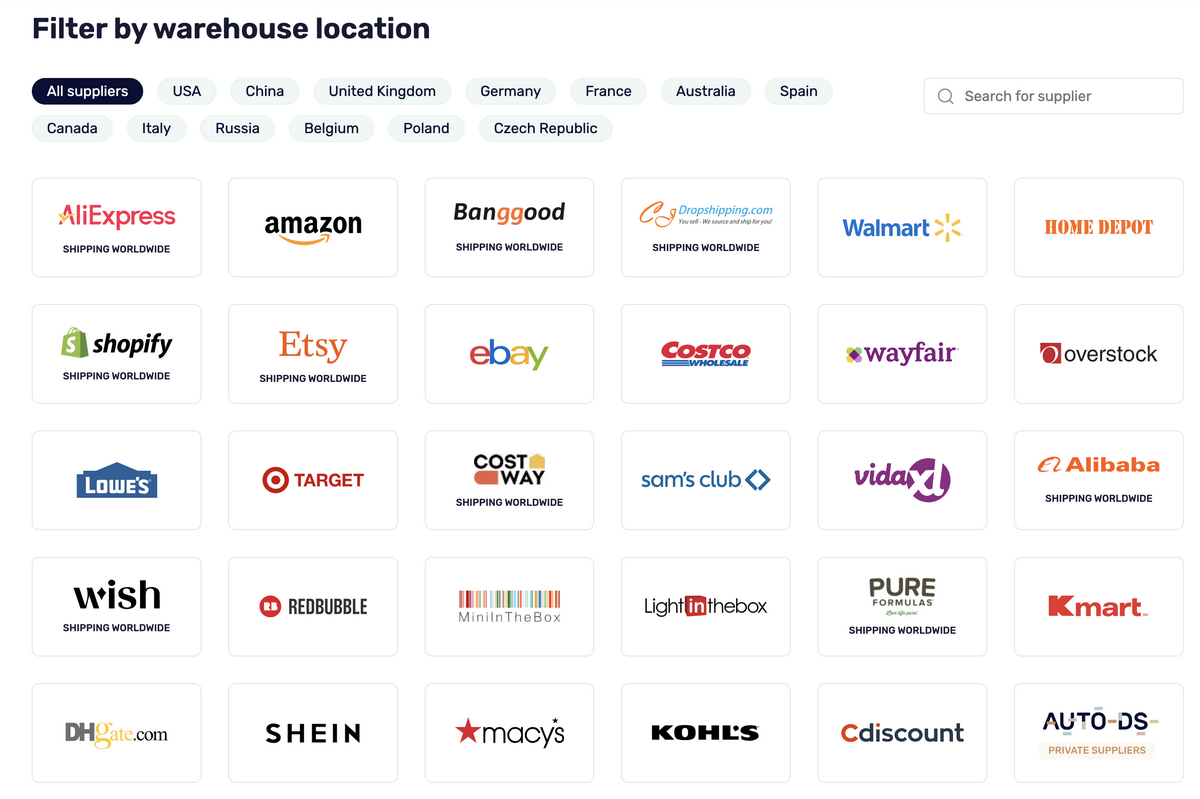
Behind every successful ghost store is a solid supplier who gets the job done. This really is one of the most critical steps. A supplier with slow shipping or bad quality products? That’s a fast track to refunds, angry reviews, and a bad reputation. Here’s what you should keep in mind when looking for suppliers:
- Fast, trackable shipping
- Consistent product quality
- Good customer support and transparent communication
- Clear return policies
Ordering a sample is always smart for testing these things out. And don’t be afraid to work with more than one supplier to reduce risks and offer product variety.
📦Supplier’s Tip: Want to avoid the hassle of supplier management? Tools like AutoDS let you automate your sourcing and fulfillment, so you’re not stuck placing orders manually. Huge time-saver.
Step 4: Import Products To Your Store

Once you’ve got your products and suppliers lined up, it’s time to stock your virtual shelves. You can do this manually, but… why? Maybe it makes sense at the beginning. But if you want to scale, simplify things, and save time, automation is the real hero.
With automation tools, you can just bulk import multiple items at once with just a few clicks, and even optimize titles and descriptions with AI to make sure everything looks clean, catchy, and ready to convert.
Tools & Platforms That Make Ghost Commerce Easier
It’s 2025, you don’t have to do it all manually. There’s a tool or app for literally everything, including ghost commerce and dropshipping. Think content creation, sourcing, fulfillment, you name it. These apps and tools can support you at every step of your workflow, saving you hours of busywork and helping you scale much faster.
Here are some of the top tools for ghost commerce:
- Photo editing: Canva is a beginner-friendly design tool, perfect for creating thumbnails, carousels, infographics, and polished visuals. Don’t be scared, you’ll be good at it even if you’ve never even touched Photoshop.
- Video editing: CapCut is one of the best free video editors for TikTok and Reels-type content. Great for quick cuts, text overlays, sound syncing, and cool effects. The mobile app is super easy to use, and you’ll get your videos in minutes.
- Social media channels: TikTok, Instagram, YouTube—these are your go-to platforms for publishing short-form content. Want to reach potential customers? Then you just have to be on these platforms. They’re driven by algorithms and highly viral content, so it’s perfect to catch some attention—no face required.
- Affiliate marketing platforms: Amazon Associates, ClickBank, and ShareASale let you earn commissions by promoting other people’s products. They are ideal for ghost commerce sellers who want other people to do the selling for them through affiliate links, or for ghost commerce sellers who don’t want to run their own store, so they promote other people’s products through faceless videos and posts.
- Automation tools: These are platforms that help you through each stage of the dropshipping or ghost commerce workflow, from finding products to order fulfillment. For example, AutoDS. Next, we’ll cover it in depth.
AutoDS For Ghost Commerce Automation
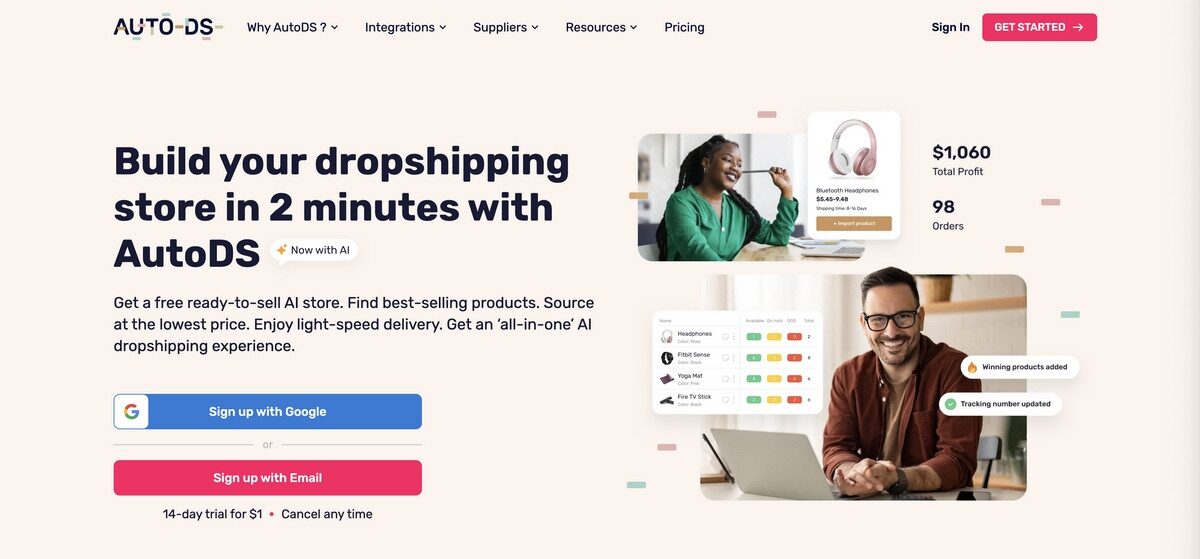
If you’re running a ghost commerce through dropshipping, AutoDS is your new best friend. It’s an all-in-one automation tool that takes care of the repetitive stuff so you can focus on content, growth, and staying ahead of trends. This is what you can do with it:
- Source products through its curated marketplace, hand-picked selection, and product research tool.
- Bulk import products from top global and private suppliers in just a few clicks.
- Automate orders and tracking updates, so you don’t have to process anything manually.
- Monitor stock and pricing, adjusting listings automatically if your supplier updates anything.
- Optimize listings with AI-generated titles and descriptions.
All in all, AutoDS gives you the control, speed, and flexibility ghost commerce demands without the burnout and the constant manual updating.
Ready to give it a try? Sign up now for AutoDS’s 14-day trial for $1 and see it for yourself.
Common Mistakes to Avoid
Ghost commerce is pretty simple, but like any business model, there are a few common mistakes you can avoid. Here are the top three, with clear, easy solutions to implement instead.
Copying Viral Content Without Adding Value
Yes: it’s tempting to grab a viral video, paste your link on it, and hope for sales. But platforms are smart, and so are users. Simply reposting without editing, adding commentary, or bringing something new to the table doesn’t really work.
👉 Try this instead: Remix the content. Add text overlays, context, or your own twist. Even a small creative spin can boost engagement and help you stand out in (really) crowded feeds.
Not Researching Product Viability
Just because something looks cool doesn’t mean it will sell. Many new ghost commerce sellers waste time and ad spend pushing products that have low demand, bad margins, or poor supplier support. Product sourcing is kind of a science—it requires a bit of time and thought, so don’t overestimate it.
👉 Try this instead: Do your research. Compare how items perform on different platforms, check if they are trending on social media, and watch out for competitors. You can also use AutoDS’s product research and ad spy tools to get ahead of the game.
Relying Solely on One Traffic Source
TikTok might be on fire right now, and posting on one marketplace might feel like enough. But here’s the thing: putting all your products in one single algorithm is risky. One shadowban, restriction, or trend shift, and your traffic can vanish overnight.
👉 Try this instead: Diversify. Repurpose your content on multiple social media channels, build email and SMS lists, and work with marketplaces as well. A multichannel approach gives your business more stability and reach.
Best Ghost Commerce Store Ideas
When it comes to finding the best ghost commerce idea, the possibilities are endless. We want to explore niches that align with the ghost commerce model and have real potential for success. We’ll dive into each niche to show why it is a top contender for your next business venture. Let’s take a look at some of the best options.
Ghost Commerce Fashion Store

The fashion niche has always been a trendsetter in e-commerce. This niche covers everything from clothing and accessories to footwear, bags, and jewelry. Fashion is all about personal expression, and with people shopping more online, it’s an ideal ghost commerce idea. Whether it’s high-end fashion, streetwear, or sustainable clothing, this niche offers endless possibilities. Popular products like dresses, sneakers, and even seasonal items like winter coats or swimwear constantly attract buyers.
According to Statista, the e-commerce fashion industry is experiencing a compound annual growth rate (CAGR) of 14.2% between 2017 and 2025. This impressive growth makes launching a ghost commerce fashion store a highly profitable idea. With a store focusing on trendy or niche products, we can reach fashion lovers without stocking inventory. We can stay flexible through dropshipping, always offering the latest collections from suppliers while keeping our overhead low.
Ghost Commerce POD Store
Print on demand (POD) stores allow us to sell custom-designed products like t-shirts, mugs, or phone cases without ever needing to buy inventory upfront. This is a great ghost commerce idea because it focuses on personalization—giving customers one-of-a-kind products.
The beauty of the print on demand niche is that we can always change or expand our offerings based on current trends or use our creativity to create unique designs or products. Whether it’s funny slogans, art-inspired designs, or niche-focused products (like gamer-themed mugs), POD allows us to serve various customer interests.
For example, here is how Christmas mugs grow in demand from October to January each year. A ghost commerce POD store can use this demand by offering mugs, t-shirts, hoodies, tote bags, and other customized merchandise with Christmas designs.

Customers love having unique, custom items; we can give them that with POD while never worrying about inventory. Suppliers print and ship products directly to the buyer as orders come in. It’s low-risk, highly flexible, and a fantastic option for running a ghost commerce store.
Ghost Commerce Pet Niche Store
The pet industry has become a multi-billion-dollar sector, as pet owners are willing to spend more and more on their furry companions. This niche includes everything from food and toys to grooming products, pet beds, collars, and more.
With more people treating their furry companions like family members, the demand for high-quality pet products continues to soar. Some of the most popular items in this niche include interactive pet toys, cozy pet beds, and even organic or health-conscious pet foods.

According to Google Trends, “pet supplies” consistently have a high volume of searches, showing just how much demand there is for pet products online. It makes the pet niche an incredible ghost commerce idea. We can tap into the pet-loving community by offering essential products or even unique, niche-focused items like eco-friendly pet supplies or personalized pet accessories.
With dropshipping, we can source high-quality products from trusted suppliers. This way, we focus on marketing and growing the business while suppliers manage the logistics.
Ghost Commerce Car Supplies Store

The automotive industry is vast and constantly evolving. A car supplies and auto parts dropshipping store lets us sell products like car parts, accessories, and maintenance tools without holding stock. This niche includes many items, from basic car care kits to performance parts and customization accessories.
Car enthusiasts are always looking to upgrade their vehicles, and with the rise of e-commerce, they’re more than happy to buy online. Popular products in this category include air fresheners, seat covers, dash cams, and performance upgrades like exhausts and LED lights.
The global automotive e-commerce market value was USD 86.55 billion in 2023, and it’s projected to grow to USD 343.13 billion by 2032. This staggering growth presents a huge opportunity for us to launch a car supplies store. By creating a specialized store, we can attract a dedicated audience while our suppliers handle all the inventory and shipping.
Ghost Commerce Beauty Product Store

The beauty industry is one of the fastest-growing e-commerce sectors. The range of products in this niche is vast, covering everything from anti-aging creams to makeup palettes, beauty tools, haircare items, and more.
People are more than willing to spend on beauty products that promise results, and online shopping makes it easier for them to access these items. Popular products in this category include serums, face masks, foundation, and beauty gadgets like facial rollers or LED skincare devices.
Global beauty sales are currently at $427 billion and are expected to grow to $523 billion by 2027. E-commerce accounts for 21% of the current beauty sales and is expected to account for 26% by 2027. With such impressive growth, creating a beauty product store is a great ghost commerce idea.
We can focus on sourcing high-quality beauty products through dropshipping or even white-labeling, giving us the flexibility to offer established and custom-branded products. Since beauty is a trend-driven industry, we can quickly adapt to new product launches and consumer preferences without worrying about overstock or upfront costs. It makes it a perfect ghost commerce niche with a high potential for success.
Frequently Asked Questions
What is ghost commerce, and how does it work?
Ghost commerce is a hidden or behind-the-scenes e-commerce model where businesses drive sales without managing inventory or operating a traditional storefront. It works by directing customers to third-party platforms or notifying manufacturers to fulfill orders once they are placed.
What is ghost commerce? Is it the same as dropshipping?
Ghost commerce is a broader concept that encompasses various hidden e-commerce models, including dropshipping, affiliate marketing, and other methods where the brand is not immediately visible to customers.
What is ghost commerce, and is it profitable?
Ghost commerce can be highly profitable due to its low overhead costs and scalability. Without the need to manage inventory, physical storefronts, or fulfillment, businesses can focus on marketing and driving traffic to their sales channels.
What is ghost commerce, and how do I start?
To start ghost commerce, select a niche and identify reliable suppliers or third-party platforms that can fulfill orders on your behalf. Then, build a strong online presence through social media, content marketing, or affiliate partnerships.
Conclusion: What We Learned About Ghost Commerce
Want to start selling online? Ghost commerce is a smart way to do it, especially for beginners looking for low-risk, high-potential opportunities. Like any business model, it has some things to watch out for. But with the right tools and decisions, it can be a thriving business.
Specifically, dropshipping stands out in ghost commerce for scalability and low startup costs. And AutoDS simplifies ghost commerce dropshipping by automating tasks like product imports, pricing, and fulfillment. Finally, affiliate marketing and other models are also worth exploring.
Want to keep learning and growing? Check out our articles for more tips, tools, and insights to help you level up your e-commerce game:






